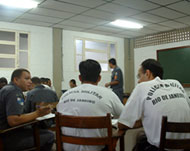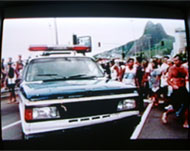Brutality sends Rio police back to class
The worst massacre in the history of Rio de Janeiro, allegedly carried out by policemen, has sent shockwaves through Brazil and put police re-training programmes in the spotlight.

Over three hours in one night, armed men careered through two communities, firing indiscriminately.
In the end, 30 people lay dead – teenagers who had been playing video games in a bar, two men who had been riding bicycles, others who had been unfortunate to be out on the street.
The 31 March killings sent shockwaves through Brazil. But when 12 current and former police officers were arrested and eight were charged with murder, the bloodbath took on an even more sinister face.
As yet, the motive remains unclear. Theories range from a reaction to the arrests of other police officers over a separate murder case to involvement in a gambling racket.
Nothing new
But perhaps more horrifying than even this is the fact that in the same area of Rio, known as the Baixada, there is an equivalent toll of the massacre, on average, every 10 days.
|
“The Baixada is very insecure. People don’t go out of their homes at night. It has become a deserted city. This is a chance to make a deep clean of the military police of Rio de Janeiro” Lindberg Farias, |
It has been revealed, too, that four of the same police gang that are accused of carrying out the one-night attack have already killed 15 people between them.
Police involvement in death squads has been condemned by Amnesty International for decades.
Lindberg Farias, the mayor of Nova Iguacu, where 18 of the deaths occurred, welcomed federal government intervention in the case.
“The Baixada is very insecure. People don’t go out of their homes at night. It has become a deserted city. This is a chance to make a deep clean of the military police of Rio de Janeiro,” he said.
One unfortunate witness to the other 12 killings in the town of
Queimados was also present at the infamous police attack in the Vigario Geral favela in August 1993 which left 21 dead.
“For us nothing is new. The film just repeats,” he said, not wanting to be named.
Police education
The non-governmental organisation Vivo Rio, now the largest in Latin America, was created in the wave of indignation after the Vigario Geral incident and a separate police attack which left eight street children dead outside the Candelaria church in Rio in the same year.
Since then it has initiated more than 30 projects aimed at trying to stem the circle of violence that poisons the city.
 |
|
The course aims to reduce the |
One specific scheme, the Citizen Police Practice Improvement Course, tries to reduce the number of killings by police officers in Rio and “to place value on police intelligence and discretion, as opposed to abusive and excessive force”.
It is small, it is voluntary, but it is a ray of hope.
Sergeant Sergio dos Santos Viera is standing in front of a semi-circle of seated military police officers.
He begins to sing a song about a house. The officers clap along sympathetically. Then he asks the room to split into teams and sing some of their own songs about houses. The team who can come up with the most songs wins.
One of the group of 16 wisecracks that they had better not come up with any funk songs [the predominant music of the favelas, or slums].
Sergeant Sergio smiles wearily and says it would be fine.
“The lessons help me just confirm what I already know, you understand,” says the funk music joker, soldier Ademir Franca Jr.
“I already know this. It’s good because we recollect past lessons and in this debate we take away our doubts. It’s a confirmation. The course helps us a lot, it’s beneficial.”
Real life
The written course materials depict the imaginary world of Sergeant Expedito, Corporal Nilson and Soldier Adbias in a different cartoon chapter every session, such as “Know how to use force”, “Life is not a film!” and “Is this a case for the police?”.
But each scenario is based on a real-life case, often of some infamous police malpractice.
|
“It’s good because we recollect past lessons and in this debate we take away our doubts. It’s a confirmation. The course helps us a lot, it’s beneficial” Ademir Franca Jr, |
One shows police shooting at three shoplifters. The officers capture one thief, take him behind the police van and execute him with three shots. Unfortunately for them, this was captured on camera and broadcast across Brazil.
Today’s debate in the Leblon district of Rio de Janeiro focuses on two scenarios – entering a slum dwelling and entering an upper middle-class dwelling.
In Brazil, most police officers are not socially removed from poverty, explains Viva Rio’s Veronica dos Anjos.
“We know a few police officers who live in favelas who can’t wash their uniforms [outside, as is the custom] because they would be killed. You have to understand that public work means a guaranteed salary and that just doesn’t exist in the private sector.
“The vast majority of police officers are there to achieve the status of being a citizen, to have a minimum income,” she says.
In the classroom, the rights and wrongs of the subject are being hotly debated.
“Going in with a lot of noise, is that wrong?” asks one.
“It’s completely wrong, man!” rebukes his colleague.
“I picked someone up from a cash point and got him to lift his shirt, but it wasn’t a gun, it was a newspaper. He didn’t have any [compulsory] ID on him, though,” says soldier Ademir.
Sergeant Sergio assures him that he behaved correctly because he was acting on suspicion “that he was outside a cash point” and not on characteristics – that he was black.
Sharing knowledge
“The sergeant has vast experience and he passes what he knows is correct to us. We know what errors have happened. Everybody makes mistakes, no?” Ademir says.
“In the classroom, people recall things and we discover new experiences from our colleagues,” he adds.
So far nearly 200 sergeants have been trained to use the teaching aids, which also include 14 videos. It is hoped the classes will eventually reach 10,000 policemen within their respective precincts.
The course was developed under the reasoning that police who are well trained can win the confidence of the population, reversing the situation of mutual distrust and fear prevalent in Brazil.
It aims to make continuing education part of officer’s routines.
“It’s very difficult to get educational courses about the rights about the military police. You enter the police, take courses for between six and eight months, go out into the streets and never go back to take any more lessons,” soldier Carlos
Henrique Campos de Rosa says.
“Today the law has changed in some aspects. We don’t have a custom within in the police to follow these changes. We work day to day. Here you can learn which laws have changed.”
All-round approach
The voluntary course is one of four projects under the Programme of Action for Public Security, partly funded by the British government development agency, DFID, and administered by Viva Rio.
 |
|
Training videos are used in the |
Another project, called Generations of Peace, began last year and gives low-income police families free theatre tickets, educational courses and sports classes, among other freebies.
“When you offer a manicure to the wife of a police officer, you are increasing their income,” coordinator Veronica dos Anjos says.
“We had one police officer who had a handicapped girl who needed to swim. He enrolled and now she’s taking classes for free. We are also looking at providing dental care and healthcare for a small rate.
“It’s not contradictory working with police and those who live in the favelas. At least twice a day police officers ‘get bombed’ because of their bad attitude, their use of excessive force. If you work with teenagers in the favelas then you must do the complete thing.”